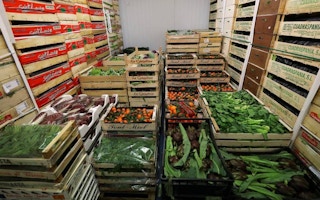Wasteless, an Israeli firm seeking to reduce food waste and save consumers money, won $2 million in funding on Tuesday, as more businesses seek to cut food losses amid rising global hunger.
The two-year-old firm sells software to supermarkets so that they can manage their stocks and reduce food prices as shelf life dwindles, reducing waste and boosting profits.
“We inspire customers to be better citizens of the world and to take part in the war against food waste, while at the same time enjoying better prices,” Ben Biron, one of the founders of Wasteless, said in a statement.
Food waste is increasingly viewed as unethical, as well as environmentally destructive, dumped in landfills where it rots, releasing greenhouse gases, while fuel, water and energy needed to grow, store and carry it is wasted.
A growing number of impact investors—who aim to bring social or environmental change as well as making a profit - are putting their money into businesses responding to political and consumer pressures to address climate change and waste.
“
We inspire customers to be better citizens of the world and to take part in the war against food waste, while at the same time enjoying better prices.
Ben Biron, co-founder, Wasteless
Globally, one-third of all food produced—worth $1 trillion—is binned every year, according to the United Nations’ Food and Agriculture Organization, and researchers fear annual food waste could rise by a third to 2.1 billion tonnes by 2030.
World leaders pledged to halve food waste by then under the sustainable development goals set by the United Nations in 2015.
Wasteless said it will use the investment from Slingshot Ventures, a Dutch venture capital firm, to focus on West European food retailers.
In a trial with a Spanish food retailer earlier this year, Wasteless said its algorithm, which allows customers to choose between older or fresher food at different prices, cut food waste by a third and increased revenue by 6 per cent.
Many experts say changing business practices and consumer behaviour, rather than giving away excess food, is key to reducing waste.
“There isn’t any more land or any more water. One of the things that has to happen is the food that is grown has to get eaten,” Oliver Wyncoll, a partner at Bridges Fund Management, a UK-based impact investor, told the Thomson Reuters Foundation.
“In the next few years you will see an increasing level of investment in food waste … The difficulty of the philanthropic charity type model is it’s not scalable unless you have a bottomless pit of donations.”
This story was published with permission from Thomson Reuters Foundation, the charitable arm of Thomson Reuters, that covers humanitarian news, women’s rights, trafficking, property rights, climate change and resilience. Visit http://news.trust.org










